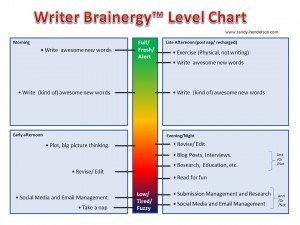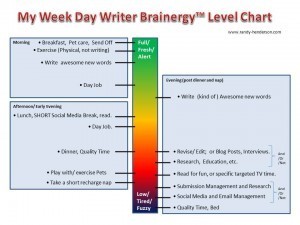Using Your Writing Brainergy Wisely
Brainergy. It’s not a new agey thing, or a result of midichlorians. It’s just my word for measuring how fresh and alert and energized my brain is feeling. And I believe learning to organize your writing schedule around your brainergy is very useful for writers.

Basic Writer’s Brainergy Chart
Alas, I am not independently wealthy and writing this from my Super Writer Cave hidden beneath stately Henderson Manor. I have to work full time, and I try to spend quality time with the people (and pets) I like. I also have myriad other little life distractions.
So people sometimes express surprise at the amount of writing that I get done (not that I’m anywhere near Jay Lake levels or anything). And it isn’t just the writing, of course, but the fact that I actually find time to finish and polish and submit my writing, and do all the other work that goes with being a writer.
One of the tricks I’ve learned to do so is to not simply make a to do list of things I want to get done, but to schedule them, and more importantly, schedule them smartly.
Basically, I order my tasks by brainergy level required.
I write new words when I am freshest, because creative writing requires a lot of brainergy. Everything else, I prioritize lower, depending on a combination of how important it is, and how much brainergy it requires.
It is so tempting to get distracted by social media and emails, by research and “research,” by the administrative tasks that seem important. The thing is, these things are generally not as difficult as crafting a story out of the air can be, so it is easy to be tempted toward doing them instead of writing.
By setting specific times to do those less important tasks, and by valuing and protecting those precious hours of high brainergy for my writing, I get my writing done.
So I’ve created a couple of pictures to try and illustrate roughly how I prioritize my brainergy during the week and on the weekends, in case you might find it interesting or useful.
They do not reflect of course the more subtle variables in writing. For example, I might be in heavy revision mode on a novel and spend the “Writing Awesome New Words” periods actually doing mostly revision for a week. Or I might spend a period focused entirely on plotting out the next novel during my writing hours.
But generally speaking, a writer should always be writing. Even if you have finished the first draft of Project A, you should ideally be working on the first draft of Project B while you are revising Project A (deadlines notwithstanding).
These pictures also do not reflect the realities of commutes, grocery shopping, caring for children, phone calls, and all the other obstacles and interruptions to your writing time. But if you prioritize your writing tasks and set general times for them, then when chores and challenges arise you can simply push your entire writing schedule back a bit and drop the low priority items off the end. This will still result in getting more writing done than if you simply plan to get some writing done today, at some point, then get sidetracked, and decide to do whatever task comes to mind instead.
Additional information you may find useful:
My SFWA article on setting writing goals and scheduling tasks.
My SFWA article on being a happy writer (which increases your brainergy).






